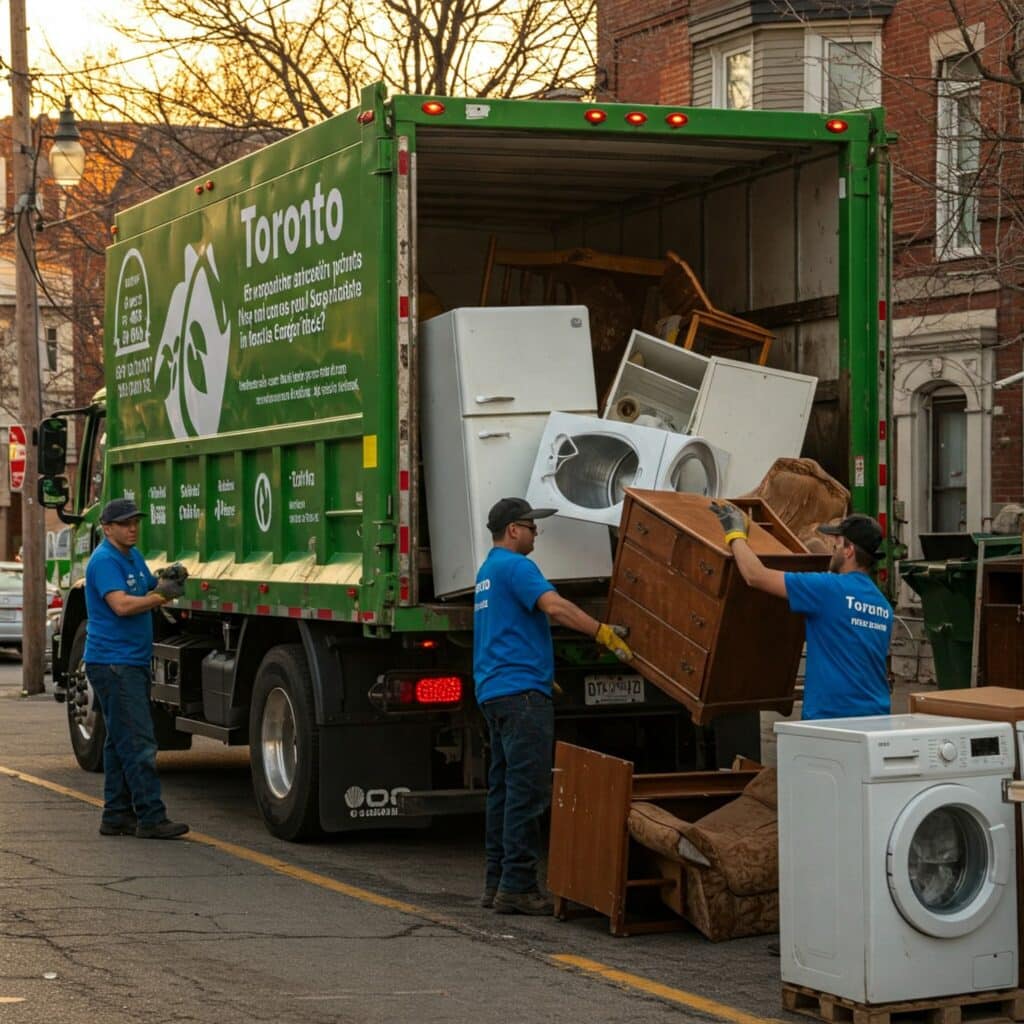Clearing out old sofas, mattresses, office chairs, or commercial fixtures is more than heavy lifting. It raises practical questions: what can be donated, what needs special handling, where does furniture legally go in Winnipeg, and how do you avoid fines or wasted trips to the dump? Mr Garbage handles furniture removal in Winnipeg from start to finish, pickup, sorting, donation coordination, and final disposal, so homeowners and site managers can get back to work or life without the hassle.
This guide walks you through everything you need to know about furniture removal in Winnipeg: why professional services matter, local rules and options, donation and recycling pathways, pricing and safety tips, and how to choose the right provider. I’ll include practical, Winnipeg-specific examples and clear steps you can use today.
Why use a professional furniture removal service?
Removing furniture sounds simple until you face tight stairwells, narrow elevators, or bulky antique pieces that won’t clear doorways. Here’s where professional teams deliver value:
- They handle heavy lifting safely to reduce injury risk and property damage.
- They know local drop-off points, donation partners, and municipal rules so your items go to the right place.
- They sort on-site when possible, increasing the chance that usable pieces get donated instead of landfilled.
- They provide documentation for commercial clients who need disposal records for audits or job reports.
For many homeowners and contractors, the time, labor, and logistical headaches of DIY removal outweigh the cost of a reliable local crew. Mr Garbage offers all this plus fast scheduling across Winnipeg.
Local context: Where furniture goes in Winnipeg
Winnipeg operates both municipal services and resource facilities that handle waste and reuse. For residents, the City offers special pickups for large items and maintains the Brady Road Resource Management Facility and 4R depots that support drop-offs and diversion programs. Commercial customers often use licensed haulers to deliver materials directly to permitted facilities. Knowing the difference matters: residential curbside programs are limited in scope and frequency, while professional haulers can manage larger, irregular loads and handle permit logistics. City of Winnipeg
When furniture is still in usable condition, donation networks like Habitat for Humanity ReStore accept large items and sometimes offer pickup within city limits. Working with a removal service that coordinates donations increases the chance of reuse and supports local charities. Habitat
How furniture is classified for disposal or reuse
Before you call a removal company, it helps to understand common categories:
- Good-condition furniture: Clean, structurally sound sofas, dressers, tables, and similar items that charities or ReStores will accept. These often qualify for pickup.
- Repairable or salvageable items: Pieces that need minor repairs but have value for reuse or resale. Removal teams will often set these aside for donation partners.
- Non-reusable furniture: Severely damaged, waterlogged, moldy, or pest-infested items that cannot be donated and must be disposed of. These usually go to a landfill or a facility that accepts mixed construction and bulky waste.
- Special items: Mattresses, box springs, and upholstered items may have specific local handling rules; some recycling services or private processors accept mattresses for a fee.
- Commercial fixtures: Cubicles, metal shelving, and office desks often have a salvage market; a good removal partner will route these to appropriate recyclers or resale channels.
Classifying your furniture beforehand speeds pickup and can reduce disposal costs because reusable pieces avoid landfill tipping fees.
Donation, reuse, and recycling options in Winnipeg
One of the best outcomes for old furniture is a second life. Winnipeg has several pathways:
- Habitat for Humanity ReStore: Accepts a range of household goods and building materials and offers pickup for large items in many cases. Donating through ReStore supports local building projects and avoids landfill.
- Local charities and thrift stores: Many smaller charities accept furniture in good condition. Pickup policies vary, so a removal service that coordinates donations is helpful.
- Specialized recyclers: For items that cannot be donated, certain recyclers accept metal frames, clean wood, and other recoverable materials. Separating these materials reduces landfill waste and can lower disposal costs.
- Mattress recycling: Winnipeg has options for mattress recycling and dedicated drop-off points; some private companies accept mattresses for processing for a fee. If you have mattresses, check with your removal service for the most current local options.
Donating whenever possible reduces environmental impact and can produce a tax receipt in some cases. A removal company that knows which partners accept which items will save you time.
Regulations and practical rules to keep in mind
Manitoba’s waste guidance and City of Winnipeg programs set out what can be diverted, donated, or dumped. For furniture specifically:
- Check local donation acceptance criteria. Many organizations will refuse items with stains, tears, or pest issues. ReStores and charities often outline condition requirements online. Habitat for Humanity
- Be aware of mattress and appliance handling rules. Mattresses may require a recycling fee; appliances with refrigerants need certified removal of ozone-depleting substances before recycling or disposal.
- If you are a commercial client or handling large volumes from a renovation, a licensed hauler provides manifests or receipts that may be necessary for site records or contractor reporting. The Brady Road Resource Management Facility and 4R depots provide drop-off options, but many commercial haulers deliver directly to permitted sites. City of Winnipeg
Asking your removal partner about documentation and local rules will avoid surprises at the dump.
How Mr Garbage handles furniture removal
When you schedule furniture removal with Mr Garbage, here’s what you can expect:
- Quick quote: Call (204) 999-5865 or submit details through the contact page. Provide the number and type of items, location details, and whether any items are inside the home or in a garage.
- On-site assessment (if needed): For large jobs or awkward items, Mr Garbage can arrange a quick walkthrough to identify access challenges and any items needing special handling.
- Donation sorting: Usable items are flagged for donation. Mr Garbage coordinates pickups or drop-offs with local ReStores and charities.
- Safe removal and transport: Crews protect floors and walls, disassemble items if needed, and use proper lifting techniques and equipment.
- Responsible disposal: Non-donatable items are sent to the appropriate facility, recycling, mattress processors, or the proper landfill/transfer station, according to local rules. Documentation is provided on request.
This full-service process reduces tasks for homeowners and ensures bulky items are managed responsibly.
Pricing: what to expect and how to save
Furniture removal pricing varies by job size, access difficulty, labour, and disposal costs. Typical pricing components include:
- Base fee or minimum charge for dispatching a truck and crew.
- Per-item or hourly labor rates for pickups that require carrying furniture down stairs or through tight corridors.
- Disposal or drop-off fees where applicable, including mattress or appliance processing fees.
- Donation coordination may be included or listed as a service line item.
Ways to keep costs down:
- Consolidate pickups: schedule one full pickup rather than multiple small ones.
- Separate donationable items ahead of time so the crew can load efficiently.
- Confirm mattress or appliance fees upfront.
- For large cleanouts, get a firm written estimate that includes disposal fees.
Mr Garbage offers transparent quotes and will advise on the most cost-effective plan for your situation.
Safety, insurance, and liability
Moving heavy furniture involves risk. Before hiring a service, check:
- The company carries liability insurance and workers’ coverage.
- How do they protect floors and walls during removal?
- Their policy for accidental property damage or injury.
- Whether they provide written estimates and a clear cancellation or rescheduling policy.
Mr Garbage trains crews in safe handling and carries the necessary insurance to protect clients and staff. That reduces your risk and ensures accountability.
Real Winnipeg examples
- Basement cleanout for a River Heights homeowner: Mr Garbage removed a full set of living room furniture, two mattresses, and several boxes. Usable items were routed to a local ReStore pickup. The homeowner avoided a two-day DIY removal and got a tax receipt for donated items.
- Commercial office decommission in Osborne Village: Office cubicles and desks were disassembled on-site. Metal and wood were separated for recycling; bulky, unusable items were taken to a licensed transfer facility with manifests provided to the client. This kept the decommission on schedule and provided the company with disposal records for their environmental reporting.
These practical examples show the time savings, legal protection, and environmental benefits of a professional removal service.
How to choose the right furniture removal service
When comparing services in Winnipeg, check for:
- Local experience and reputation. Local companies know Winnipeg’s donation partners and disposal rules. Mr Garbage has local roots and focuses on Winnipeg-area jobs.
- Donation partnerships. Ask which charities the company works with and whether pickups or drop-offs are included.
- Transparent pricing. Get a written estimate that clarifies disposal fees.
- Insurance and safety practices. Confirm liability coverage and crew training.
- Documentation for commercial jobs. If you need manifests or disposal receipts, make sure the provider can supply them.
A well-chosen partner reduces stress and ensures your items are handled responsibly.
Quick checklist before your pickup
- Clean and identify donation items.
- Remove breakables and secure loose parts.
- If possible, disassemble large furniture to speed removal.
- Note any access challenges (narrow doors, staircases, elevators) when you request a quote.
- Confirm mattress and appliance fees if those items are included.
- Ask for documentation if you need it for a sale or audit.
Preparing a little in advance makes the process smoother and cheaper.
Conclusion
Furniture removal in Winnipeg is simpler and more responsible when you work with a local, experienced team. Mr. Garbage handles pickup, donation coordination, recycling routing, and responsible disposal while keeping safety and transparency front and center. Whether you are a homeowner clearing out a house, a landlord preparing a rental, or a contractor finishing a site, a trusted removal service saves time, reduces risk, and increases reuse. Call (204) 999-5865 or visit our Contact Us page to book furniture removal in Winnipeg today. Let Mr Garbage take care of the heavy lifting so you can focus on the next step.
Frequently Asked Questions (FAQ)
What items can Mr Garbage remove from a home in Winnipeg?
Mr. Garbage can remove couches, chairs, mattresses, dressers, tables, appliances, and other bulky household items. Usable items can be separated for donation, and some items, like appliances, may require special handling.
Can you donate furniture during furniture removal?
Yes. Mr. Garbage coordinates with local partners such as Habitat for Humanity ReStore and other charities to donate usable furniture. Pickup or drop-off for donations is arranged when items meet charity acceptance standards.
How much does furniture removal in Winnipeg cost?
Costs vary by job size, labour required, and disposal fees. Mr Garbage provides transparent quotes that list labor, transport, and any applicable disposal or recycling fees. Call (204) 999-5865 for a tailored estimate.
How should I prepare furniture for removal?
Clear pathways, disassemble large items where possible, and separate donation-worthy pieces. Note any stairs or elevator limitations so the removal crew can plan. This reduces labour time and can lower costs.
What happens to furniture that cannot be donated?
Non-donatable furniture is taken to an appropriate disposal facility, such as a transfer station, landfill, or specialized recycler. Mr Garbage routes items to the correct facility and can provide disposal documentation on request.

